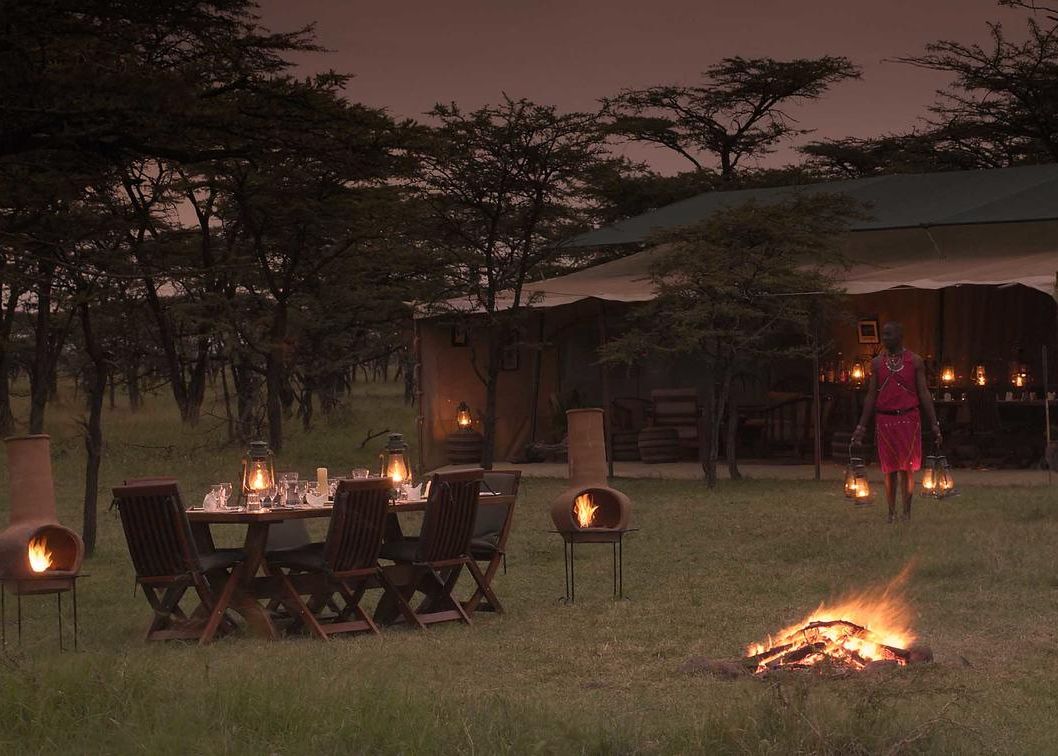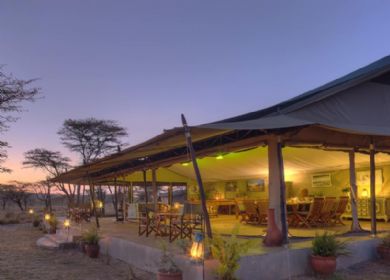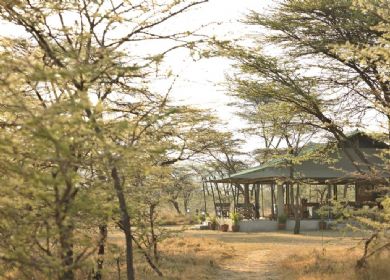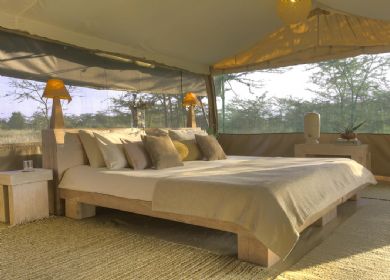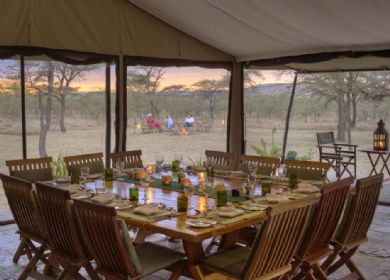
For visitors coming to Kenya for the first time, there are many unanswered questions — what do we pack, what are the entry requirements and so on. To make your visit a truly relaxing and well-prepared one, here are the answers to all those questions. All the information below is given in good faith and has been carefully compiled. It must be accepted that details will change from time to time! And of course, please feel free to contact us with any questions you may still have.
An entry visa is required but this must now be issued in advance online via www.evisa.go.ke.
Please consult a medical practitioner for the complete up-to-date requirements. Due to the low to moderate malaria risk at our camps, it is advisable that you take a malaria prophylaxis. Once again consult a medical practitioner on which prophylactic is recommended.
The long rains are from early April through May, and the short rains in November. As with many parts of the world weather patterns have become unpredictable so you may encounter any type of weather on your visit. Dry seasons offer excellent visibility and more reliable road conditions whilst wetter times offer dramatic skies and less dust. Temperatures are generally pleasant 20-25C on average though cold in the mornings June – Sep and in Laikipia be prepared for cold mornings year round.
Generally speaking, East Africa is cooler than most people expect for a region on the equator this is due to the altitude (1500-2000 metres) over much of the area. Therefore, it is highly recommended to have a warm jacket or jumper for cold mornings and cool evenings, especially in Laikipia. During the day however it is usually quite warm. Light long sleeved shirts and trousers are recommended for the evenings to avoid mosquito bites. Natural safari colours are recommended especially if you are game walking, they are also ideal to conceal the African dust! Good walking shoes/ boots will be useful. A sun hat, sunglasses, lotion, lip balm and skin moisturiser are important to counteract the sun, wind and dry conditions. A good insect repellent is essential to bring (brands with 50% DEET content are very good). Most toiletries and pharmaceutical products are available in the larger cities however rural areas only have a very limited selection therefore you should bring any items you may need.
It is highly recommended to bring a camera with a zoom lens of at least 200mm for wildlife shots. A bean bag or jumper is useful to rest your camera on for shooting in low light (tripods are too cumbersome for use in a vehicle). We have several locally made bean bags at the camp. Don’t forget to bring a spare camera battery, although charging points are available in our vehicles. Please remember to bring sufficient memory cards or alternative data storage for your video and images. Another important item to bring is a pair of binoculars. It is worth buying a pair if you unable to borrow. Small compact binoculars are fine and handy to carry around however a larger (e.g. 7x50) pair will be superior in the low light conditions in the morning and evening when most game drives take place. If you wish to reduce your toiletries all our camps provide good quality soap, shampoo and body lotion made in Kenya from natural products.
Each tent is equipped with natural and biodegradable body wash, lotion, shampoo and conditioner. There is washing powder to wash the sensitive undergarments, cotton swabs, a torch, and insect spray. Wet weather boots and umbrellas in the event of rains are also provided.
Laundry services are provided free of charge to all guests at Kicheche Camp. Please note due to cultural reasons women’s underwear is not included in this service
Sockets are 3 pin UK style, with USB. Voltage is 240V/ 50Hz. Charging points are provided in the camp lounges and in our vehicles.
It is recommended to bring a soft bag rather than a suitcase as they are easier to carry and are less prone to damage. On internal flights, the baggage limit is 15Kgs per person, inclusive of hand baggage. If you have extra space in your luggage and would like to assist our communities, please visit https://kicheche.com/community/ and see “what to bring”. Donations can be given to your transfer driver in Nairobi to be dropped at our Nairobi office.
Meals at the camp are mostly Western in style and hygiene standards are high. Please advise us of any special dietary requirements in advance
Mineral water is provided daily in each tent. Do not drink from the taps in your bathroom.
The official languages are Kiswahili and English. English is widely spoken except in some rural areas.
The currency is Kenyan shillings which is preferred by all outlets. The easiest hard currencies to exchange into Shillings are US dollars, UK pounds (not Scottish pounds), Euros. Other major currencies are accepted but only at foreign exchange bureaus in cities which also offer the most competitive rates of exchange followed by banks then hotels/camps. There are 24-hour Forex bureaus and ATM’s at Nairobi’s International Airport. One can withdraw Shillings from ATM machines which are widely dispersed in cities. Kicheche Camps accepts Visa, MasterCard and AMEX at all camps.
International and domestic departure taxes are included on your tickets. Please allow for tips and if you visit a Masai Village you will need cash ($25 or equivalent in Kenya shillings) for entrance or any souvenirs.
Do not carry valuable items unnecessarily; always use safe deposit facilities at your hotel or camp. Do not wander on the streets of towns or along the beach at night. Violent crime is rare but petty crime is quite common.
It is customary in East Africa to tip your lodge/camp staff. As a guideline allow approx. $10-$15 per person per day, to be split between your guide and camp staff. However, it is not compulsory and tips should only be given if you are satisfied with the service provided. Unfortunately we can’t accept tips through credit cards.
Kenya, Tanzania & Uganda are all GMT+3 hours and do not have summertime/daylight savings.
E-mails can be passed onto you via our office when possible. C/o Kicheche Camp Ltd. Tel: 254.20.2493569/ 2493512. Out of hours contact +254736888055 E-mail: sales@kicheche.com
Mobile phone signals are available at all our camps however connections are sporadic and unreliable. In order to retain the safari atmosphere of the camp please keep your mobile phones on silent mode. Mobile use is not permitted in camp public areas and in vehicles on the game drive. There is Wi-Fi available in all our camps, however speeds are slow (not supporting streaming) and usage is limited to designated areas only.
There are numerous handicrafts available such as a wide selection of carvings in wood and soapstone, textiles, jewellery and leather goods. In our shops, there are also books to buy for the schools we support.
Always ask permission before taking photographs of people. It is quite common to be asked to pay a fee for the privilege. Agree on a fee before taking any photographs. When in doubt check with your safari guide.
When close to wildlife it is important to remain silent and not make any sudden movements so as not to startle the animals. Please remember wildlife is just that and the animals you will see are wild and unpredictable despite appearances. You are very safe in a vehicle but on foot you must keep a respectable distance. It is forbidden to leave your vehicle when in the reserve except in a few authorised areas.
Guidebooks:
Kenya-The Rough Guide, Richard Trillo
Insight Guide to Kenya
Wildlife:
The Big Cat Diary, Jonathan Scott
Portraits in the Wild, Cynthia Moss
The Safari Companion, Richard Estes



Maa Trust visit

* Age limits apply

Please see the details of the protocol in the Documents section
TRAVELLING TO KENYA: Keeping it Simple
Step 1. An entry visa is required but this must now be issued in advance online via www.evisa.go.ke.
Step 2. All passengers (inclusive of transit passengers) are required to produce a printed copy of a Negative PCR Test upon arrival at Nairobi JKIA Airport with the test taken 96 hours prior to arrival.
Step 3. All passengers prior to arrival in Kenya must complete a Health Surveillance form within 24 hours of departure. The resultant QR code issued, either printed or digital, will be scanned on entry. An alternative to the above online form is to download and register on the Jitenge App via Google Play or the App Store.
Karibu Kenya and a wonderful feeling of freedom on Safari awaits you
Step 4 – Departure
Most countries will require you to present a Negative Covid PCR Test upon entry and PCR testing is available to all our guests with a 24 hour turnaround. We are arranging in house PCR tests in all our Mara camps ($150 per person) and at our Laikipia Camp ($100 per person). The test result is then automatically uploaded to the Trusted Travel Portal (Panabios), and emailed to the traveler, with an LT code that must be presented at JKIA airport on departure.

The Kicheche Community Trust‘s mission is to encourage the preservation of the environment whilst improving the welfare of the community through improved health and education facilities.
Please click here for further information

 Provisional booking: will be held for 7 days and can be extended. If the booking is not confirmed before the expiry date, the provisional booking will be released automatically.
 Deposit: A 10% deposit must be received upon booking in order to confirm.
 Full payment: Full payment is required a minimum of 45 days prior to clients' arrival. Kicheche reserves the right to release the booking if the full payment is not received.
 Cancellation policy -
 45 days or more: Loss of deposit; 45-31 days: 50% cancellation charges; 30 days or less: 100% cancellation charge
 Group allocation booking policy for 3+ tents – check our separate booking policy
 Group Cancellation policy (3+ tents) - 90+ days: Loss of deposit; 90 -31 days: 50% cancellation charge; 30 days or less: 100% cancellation charge
 Tour leader rate: applicable for a tour leader tent and reserved for a leader accompanying a group of paying guests



